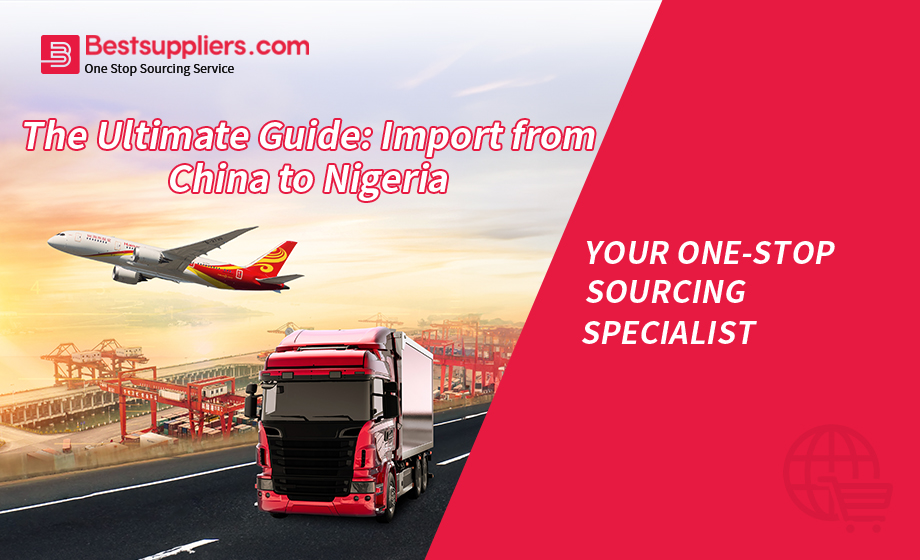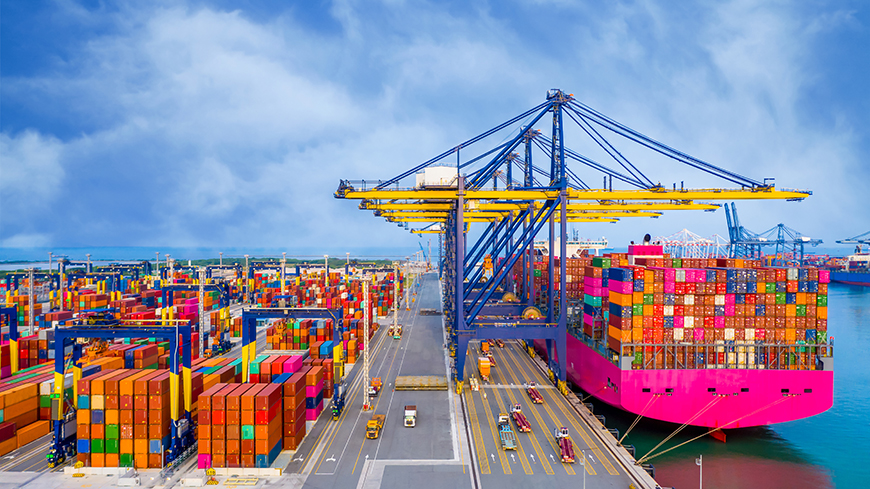The Ultimate Guide: Import from China to Nigeria

Introduction:
The importation of goods from China to Nigeria has become increasingly popular in recent years. This trend can be attributed to several factors, including the availability of a wide range of products at competitive prices, the ease of doing business with Chinese suppliers, and the growing demand for affordable consumer goods in Nigeria.
However, importers need to navigate potential challenges effectively by conducting thorough research and implementing appropriate strategies. By capitalizing on these opportunities while mitigating risks effectively through proper planning and execution processes; Nigerian businesses can continue reaping the benefits that come with importing from China.
A guide designed by Bestsuppliers will assist you in the process of importing products from China to Nigeria.
What Goods Does Nigeria Import from China?
Nigeria, a country located in West Africa, has been heavily reliant on imports from China for several years. The goods imported from China play a crucial role in Nigeria's economy and have a significant impact on its development. Nigeria's imports from China have increased by 183.91%
Nigeria imports more of the following items:
- Machinery and equipment
- Electronics and electrical equipment
- Textiles and Clothing
- Building materials
- Plastics and rubbers
- Transportation goods
- Consumer electronics
- Tools and Hardware
- Office and home appliances
How Do I Pick the Best Import Categories to Trade with China?
You need to identify a niche that will work for your organization at much reduced rates given the number of products you need to import. Making a profit and maintaining your firm is the ultimate goal of doing business.
Utilizing nations like China for business is frequently done to lower production costs and boost profit margins. Before importing products into Nigeria, you can follow these rules:
- 30–50% profit margins
- sufficient and constant demand
- Reliability
- Low maintenance needs during transportation and storage
- No regulations forbidding the products
- Import lightweight products to minimize the shipping cost
- When purchasing merchandise in China, there are certain things you need to remember.
- Do some background research on the Chinese suppliers.
- Verify the supplier's language proficiency and the type of cash they use for transactions.
- the opinions of past customers who purchased goods from the Chinese provider
- Before placing an order with the supplier for big amounts, get samples.
Choose easily manufactured products that will not have high margins of errors to maintain the quality of the products.
Products prohibited from entering Nigeria:
China provides all kinds of products, however, Nigeria has numerous rules and regulations regarding international trade, that being said, there are some items prohibited from crossing Nigeria's Borders.
- Here’s the list:
- Pork
- drugs, alcohol, and narcotics
- Wasted pharmaceuticals
- cars that have been in use for more than 15 years after their manufacture
- Industrial and nuclear resource waste
- used clothes or accessories
- Water
- A medication that fits into categories 3003 and 304
- rugs and specific types of flooring
- sacks of cement
- Paperboards and crumpled paper used in refrigerators freezers and compressors
Trying to Find Products to Import from China?
Here are some highly desired commodities you may import from China to Nigeria if you're thinking about starting an import business.
Clothing,
shoes,
mobile phones,
electronics,
accessories,
furniture,
doors,
building materials,
pharmaceuticals, and
human hair is just a few examples.
As far as items go, the list is infinite. The country has a great demand for goods like human hair, and you can buy big amounts of it from Chinese vendors for a reasonable price. Another class of goods you may want to think about is phones, gadgets, and associated accessories because there is such a high need for them in Nigeria. If you are new to the importation company, you should choose some of these incredibly profitable stuff.
How to Choose a Chinese Business Partner?

The Chinese company must have extensive product knowledge. Additionally, they ought to run a reputable and established business.
They consent to a price that provides you with a substantial profit margin.
The business must provide warranty and/or after-sales support services.
They require all pertinent certificates needed in Nigeria.
They can provide references and export to Nigeria.
The business should provide fair terms for payments.
How Can Goods Be Shipped from China to Nigeria?
Sea freight and air freight are the two main ways to ship goods from China to Nigeria.
Sea Freight | Air freight |
Your goods will be packed in a container | A container might or might not be used depending on the size, nature, and capacity of your cargo |
Your goods will take some time to arrive at your destination | Air freight shipment is a better choice if you want your goods to be delivered fast and it is very reliable |
Sea freight is less expensive compared to air freight | Air freight is expensive compared to sea freight |
Better for nonperishable items | Better for items with short shelf life |
Compared to air freight, ocean freight has a significantly lower carbon footprint. | When it comes to delivering hazardous commodities like gases, flammable goods, magnetic stuff, or anything with a danger sign on the package, airlines are likewise subject to more rigid regulations. |
A Few Shipping Terms(Incoterms) You Should Understand:
Incoterms are contracts between buyers and sellers that specify the scope and gravity of each party's involvement in the transaction. Without Incoterms, international trade would be more difficult and there would be conflicts and asset losses. Make sure you read the incoterms before placing an order for products from China to prevent contractual hiccups or possible asset loss.
EXWorks
Buyers under ExWorks assume greater obligations than sellers because the buyer is in charge of onward transport as soon as the supplier delivers the goods to the agreed destination.
FOB
This is a Free On Board agreement, the seller will deliver the goods from the factory or warehouse to the ship for further shipping. From the time the goods are transferred to the ship until they reach their destination, the buyer is solely responsible for them.
DDP
This is a Delivery Duty Paid agreement. Under this one, the Seller has complete control over all logistical arrangements and financial obligations. The goods must be prepared, moved, and shipped by the seller to the buyer's country of residence.
CFR
In full this is Cost and Freight Incoterms. It involves the seller bringing the goods to the port, arranging for their export, and bringing them to the ship for sailing (in short the seller is responsible for exporting the goods). While the buyer is responsible for clearing the cargo at the port of destination.
DDU
DDU, also referred to as Delivered Duty Unpaid, is the antithesis of DDP. A DDU agreement limits the buyer's financial responsibility to pay the import duty tax. The vendor is responsible for all other expenses.
CIF
CIF, which stands as one of the most crucial terms agreed upon by both parties, is borne by the seller, not the buyer. Insurance is a crucial part of international trading and shipping.

How Should You Run Your Shipping Operations?
The procedures used to move goods from one location to another are referred to as shipping operations. Freight shipping and small parcel shipping are the two categories into which the majority of shipping activities fall.
Prioritize clear and consistent communication with the supplier and other responsible people during shipping operations
Create a to-do list: This is done to monitor the item's progress as it travels through the shipping system.
Conduct regular quality checks to make sure the packaging materials are reliable, durable, and fit the intended use.
Use shipping and tracking software to make sure you have the right address, to inform the client and the business, and to track the package so you can easily locate it. Many clients want tracking numbers from the business so they can find the item and know when to anticipate delivery.
Recruit a freight forwarder with a base in China: Due to their direct contact with the source, the forwarders can simply keep you informed about your order. The forwarder is well-positioned to address and make an effort to resolve any concerns that may come up. This freight exchange option is also rather economical but will save you money.
Take complete control: You will need to personally reserve a place with airlines or freight lines if you use this tactic. Additionally, you will be responsible for handling Customs Declarations on both ends (in China and Nigeria). You must, in essence, assume complete responsibility for your purchases from Nigeria. Even if it works, this strategy can take up a lot of your time. The greatest candidates for this trading option are well-established export-category enterprises.
What Are the Nigerian Requirements for Product Compliance?
Product names, country of origin, specifications, date of production, batch or lot numbers, and the standards to which they were made (e.g., BS, DIN, ISO/IEC, NIS) must all be shown on products entering Nigeria, according to the country's government. Products should include the expiration date or shelf life as well as the active ingredient(s), if relevant, for things like food, drink, and cosmetics.
All imported goods must only be marked with metric measurements. Items containing two or more markings will be seized or denied entrance. The Standard Organization of Nigeria has more details about labeling.

Projecting Nigerian Imports from China in the Future:
Trade links between Nigeria and China have historically benefited both nations. Projecting Nigerian imports from China in the future requires careful consideration of economic growth prospects, government policies, technological advancements, changing consumer preferences as well as potential challenges ahead. While it is reasonable to expect an upward trend in Nigerian imports from China due to their strong bilateral ties and competitive pricing advantages offered by Chinese products; external factors must also be taken into account. By closely monitoring these factors, policymakers and businesses can make informed decisions to ensure sustainable trade relations between Nigeria and China.
Concluding Remarks:
I think you've learned enough about bringing products from China to Nigeria and have a decent understanding of how these businesses operate. The importation of goods from China to Nigeria has become a significant aspect of the Nigerian economy. Over the years, Nigeria has witnessed a surge in imports from China due to various factors such as affordability, quality, and availability of products.
Contacting Chinese suppliers would be the best course of action right now if you want to conduct business successfully in the year 2021. And conduct business with their capable manufacturers for imports. You can still receive reliable services without having to pay millions of extra cash.

